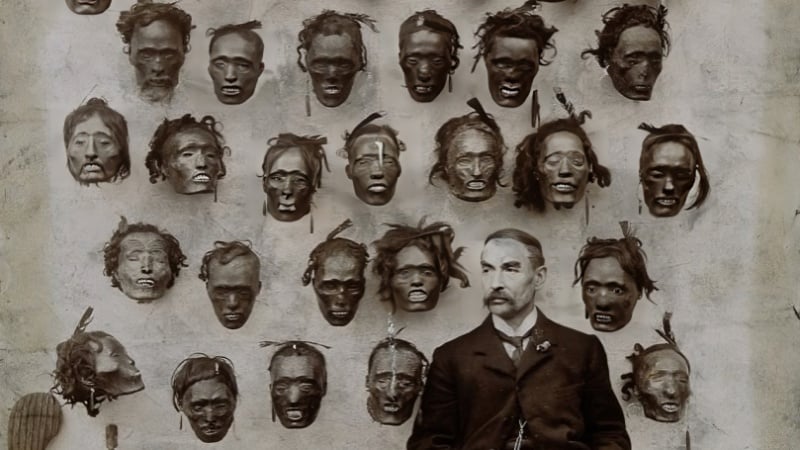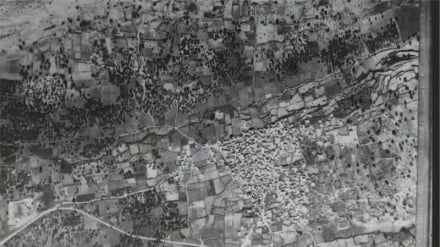Revisiting western crimes | Britain’s atrocities in New Zealand
-

A collection of the heads of New Zealand’s indigenous people who were killed in battles against British invaders. New Zealand; 1895
Pars Today – During its colonial rule in New Zealand, Britain committed crimes whose effects remain today in Maori society and the country’s political structure.
According to Pars Today, in the 19th century, with the expansion of the British Empire’s influence in Oceania, New Zealand became one of the main targets of British colonizers. The arrival of European settlers and the signing of the Treaty of Waitangi in 1840 between British representatives and some Maori tribes marked the beginning of a period of bloody conflicts and widespread injustices. The treaty was intended to protect Maori rights, but in practice, it became a tool for Britain’s complete domination.
Colonial wars against the Maori tribes
After the signing of the treaty, disputes over its interpretation began. Despite initial promises to protect indigenous rights, the British government quickly implemented policies that led to the confiscation of tribal lands and the weakening of Maori social structures. In response to these actions, the Maori tribes resisted, and wars erupted between them and British forces, which became known as the “New Zealand Wars.”
These wars, which lasted from 1845 to 1872, were marked by extreme violence, with thousands of indigenous people killed, wounded, or displaced, and villages and farmland set on fire. During these conflicts, the British army employed tactics such as burning villages and destroying food supplies, and many Maori leaders were imprisoned or executed. Furthermore, after the wars ended, vast tracts of Maori land were confiscated and given to European settlers, resulting in widespread poverty and the destruction of the indigenous traditional economy.
Historical data show that the so-called “New Zealand Wars” resulted in heavy casualties relative to the indigenous population.
Northern wars (1845–1846)
- Location: Bay of Islands
- Cause: Maori protest against the reduction of their political and economic power following the signing of the Treaty of Waitangi
- Casualties: About 94 British soldiers killed, around 28 Maori killed at the Battle of Ohaeawai
Southern wars (1847–1848)
- Location: Wellington region
- Cause: Disputes over the ownership of tribal lands
- Casualties: About 15 Maori killed, around 11 British soldiers killed
Taranaki wars (1860–1861)
- Location: Taranaki region, North Island
- Cause: Tribal resistance against land confiscation
- Casualties: Over 200 Maori killed, around 100 British soldiers and European settlers killed
Waikato wars (1863–1864)
- Location: Waikato region
- Cause: Suppression of the Maori King Movement
Casualties: About 500 Maori killed, around 230 British soldiers and their allies killed
East Coast wars (1865–1872)
- Location: Eastern regions of the North Island
- Cause: Suppression of Māori religious and political movements, such as the Pai Mārire movement
- Casualties: Over 300 Māori killed, around 100 government forces killed
According to historical estimates, the total casualties of the New Zealand Wars are as follows: over 2,000 Maori killed and around 800 British soldiers and settlers killed. These figures account only for direct battlefield deaths and do not include indirect losses from displacement, disease, and famine.
Land confiscation and the destruction of the indigenous economy
One of Britain’s major crimes in New Zealand was the widespread confiscation of Maori lands. With the enactment of colonial laws, tribal lands became the property of the British government and were handed over to European settlers. This action:
- Destroyed the traditional Māori economy
- Caused widespread poverty and homelessness among the indigenous population
- Disrupted the social structure of the tribes
Attempt to destroy cultural and identity heritage
British colonization was not limited to military and economic aspects. In addition to the military dimension, cultural colonization was heavily enforced. Cultural policies aimed to assimilate the Maori into British culture and included:
- Making English instruction mandatory in schools instead of the Maori language
- Banning or demeaning indigenous rituals and traditions
Maori children were separated from their families and raised in British-style residential schools—a practice that also occurred with Indigenous people in Canada. These actions severed generations of Maori from their cultural roots, causing an identity crisis and leaving deep psychological and social impacts. Today, many Maori still grapple with the consequences of these crimes and seek historical justice and reparations.
Judicial injustice and institutionalized discrimination
During the colonial period, New Zealand’s judicial system was highly discriminatory:
- Maori had no representation in the courts
- Land and property laws were structured in favor of European settlers
- Harsh punishments were imposed for indigenous protests
These injustices eroded Māori trust in government institutions and created a deep social divide.
Psychological and social consequences of colonization
Britain’s crimes in New Zealand had long-term effects:
- Increased rates of suicide and addiction in Māori communities
- Lower levels of education and health among the indigenous population
- Feelings of marginalization and loss of identity in subsequent generations
These consequences are still evident in New Zealand’s social statistics today, highlighting the deep scars of colonization.


